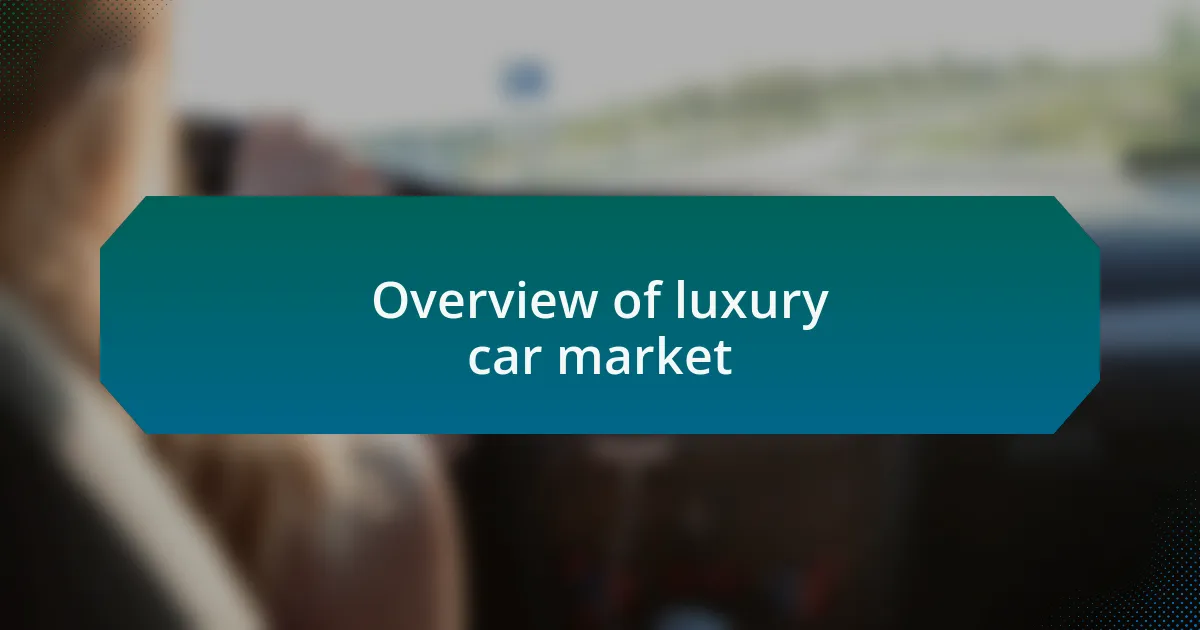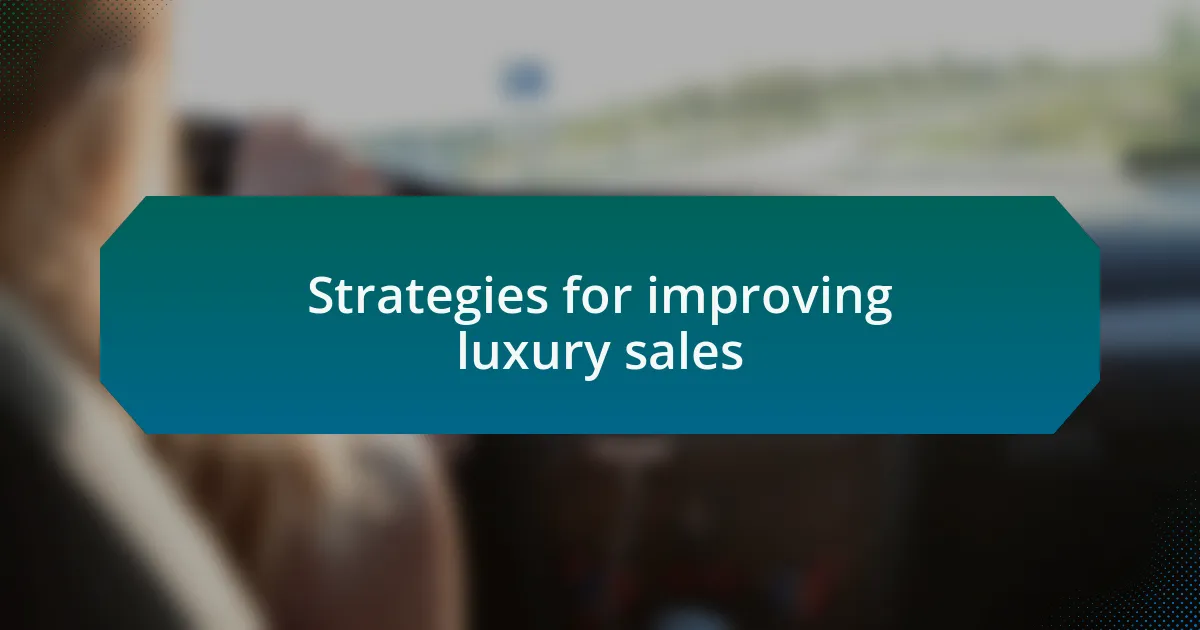Key takeaways:
- Segmentation analysis reveals diverse buyer motivations, including sustainability and emotional connections to brands, driving targeted marketing strategies.
- Consumer feedback emphasizes the importance of trust, personalized experiences, and integration of sustainability in luxury car purchases.
- Exclusivity and technology enhance luxury sales by creating urgency and offering immersive experiences that resonate with buyers’ desires.

Understanding market research methods
When I first delved into market research, I was surprised by the sheer variety of methods available. From surveys and interviews to observational studies, each technique offers unique insights into consumer preferences. Have you ever thought about how a simple questionnaire could reveal a wealth of information about what luxury car buyers truly desire?
One method that particularly struck me was segmentation analysis. It’s fascinating to categorize customers based on factors such as demographics, buying behavior, or even psychographics. This approach taught me that understanding the nuances of different buyer profiles is crucial when positioning high-end vehicles. I remember a client who thought all buyers were the same, but after analyzing data, we discovered a significant segment focused on sustainability — a game-changer for marketing.
Another eye-opening experience was utilizing focus groups. Engaging with potential buyers allowed me to observe firsthand their emotional connections to different brands. I’ll never forget the moment one participant described the feeling of driving a luxury car as “being in a dream.” It really underscored the importance of emotions in marketing decisions, showing me how effectively capturing those sentiments can influence product development and marketing strategies.

Overview of luxury car market
The luxury car market is a fascinating realm, blending high-end engineering with sophisticated consumer preferences. Luxury brands often thrive not just on the quality of their vehicles but on the status they convey. Watching a friend excitedly unveil his latest purchase—a sleek, Italian sports car—made me realize how much buyers see their vehicles as extensions of their identities.
In my exploration of the market, I noticed that geographic location plays a pivotal role in luxury car sales. For instance, observing sales trends in urban areas versus rural settings sheds light on different consumer behaviors. One memorable conversation with a dealership manager revealed that buyers in metropolitan areas often prioritize cutting-edge technology, while those in suburban areas lean towards spacious, family-friendly options. Isn’t it intriguing how location can shape desires?
Another key takeaway for me was the increasing importance of sustainability in luxury car purchases. I recall attending a luxury expo where electric vehicles were showcased alongside traditional gas-guzzlers. The palpable excitement among attendees for eco-friendly options was a clear signal that the market is evolving. How can luxury brands adapt to this shift without compromising their core appeal? This question has sparked many discussions for me, reminding me that the luxury car market is not just about prestige; it’s about aligning with modern values.

Insights gained from personal research
Throughout my personal research, the intricacies of customer motivations became strikingly clear. While attending a prestigious auto show, I engaged with buyers who passionately shared their reasons for choosing particular brands. It was enlightening to hear that many see their luxury car purchases as rewards for personal achievements, reflecting not just financial status, but milestones in their lives. How powerful is that connection between a vehicle and one’s personal narrative?
Delving further, I discovered that the experience of luxury car ownership is just as significant as the vehicle itself. One afternoon, while discussing options with a potential buyer over coffee, we touched on the importance of personalized service. He recounted how a simple, genuine interaction with a sales consultant made him feel valued, emphasizing that luxury isn’t just about the product—it’s about the entire journey. Doesn’t that elevate the conversation beyond mere transactions?
Another pivotal insight emerged during my conversations with long-time luxury car owners, who often highlighted the community aspect of their purchases. I remember a spirited discussion with a couple who felt a deep camaraderie within ownership clubs, where shared experiences fostered lifelong friendships. It made me realize that these connections often contribute to brand loyalty and repeat purchases. Isn’t it fascinating how the emotional ties to vehicles can last far beyond the initial sale?

Lessons learned from consumer feedback
Consumer feedback has unveiled some surprising insights for me. One time, I spoke with a buyer who had decided against a car despite its luxurious features because the online reviews painted an inconsistent picture of reliability. This taught me that while design and performance captivate buyers, trust in a brand’s dependability often sways their decisions. Isn’t it intriguing how much power consumer opinions hold over the purchasing choices in the luxury market?
During a recent consultation with a potential buyer, I learned that many are looking for more than just a high-end vehicle; they want sustainability and ethical practices integrated into their purchase. For instance, this buyer passionately discussed their desire for brands that prioritize environmental responsibility. This feedback reinforced my belief that aligning luxury with conscious consumerism can elevate brand perception. Who could have imagined that luxury and sustainability could go hand in hand in such meaningful ways?
Moreover, listening to feedback from younger luxury car enthusiasts has also opened my eyes to shifting trends. A memorable conversation with a first-time buyer revealed a strong preference for tech-savvy features, such as advanced connectivity options and driver assistance systems. It was clear that these aspects contributed significantly to their definition of luxury. This conversation highlighted that staying attuned to these evolving desires is imperative for brands aiming to engage the next generation of affluent consumers. Isn’t it fascinating how the definition of luxury is continuously evolving based on consumer dialogues?

Strategies for improving luxury sales
To effectively improve luxury sales, I find that personalizing the customer experience is essential. One time, I had a potential client who mentioned feeling overwhelmed by impersonal sales tactics. When I took the time to learn about their specific preferences and needs, the conversation shifted. It transformed from a transactional exchange to a genuine dialogue, ultimately resulting in a sale—because they felt valued and understood. How often do we forget that luxury is just as much about the experience as it is about the product?
Another strategy that has proven effective is leveraging exclusivity and limited editions. Recently, I attended an event showcasing a brand’s special series. The allure of owning something not readily available to everyone sparked excitement among attendees. This reminded me that exclusivity creates a sense of urgency; it speaks to a buyer’s desire to stand out. Isn’t it intriguing how a limited offering can elevate perceived value and drive consumer engagement?
Lastly, embracing technology through immersive experiences can radically enhance the luxury buying journey. I recall a client who was captivated by a virtual reality (VR) presentation that allowed them to experience different models in various settings. This innovative approach not only showcased the cars but also created an emotional connection, making the vehicles feel more relatable. It’s incredible to think that by incorporating technology, we can transform a traditional sales process into an unforgettable adventure, making luxury cars even more desirable.